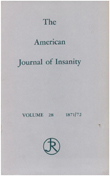Patient response and resource management: another view of clozapine treatment of schizophrenia
Abstract
OBJECTIVE: Issues in clozapine treatment were considered in terms of implications for resource management. METHOD: A critical review of the literature on time course and pattern of response to clozapine was used to address treatment of negative symptoms, late responders, and extent of clinical benefit in ordinary settings. RESULTS: Superior efficacy of clozapine for partial and poor neuroleptic responders is observed in about one-half of the cases. Response is rapid once a therapeutic dose is reached, and the data do not support the proposition that some patients first respond only after 3-12 months of therapy. The cumulative benefit over several months of treatment and the broad range of symptoms involved in response are similar to those for typical neuroleptic drugs, suggesting that clozapine's superiority is based on greater effectiveness rather than a unique profile of treatment effects. Clozapine appears to be effective for secondary, but not primary, negative symptoms. Modal response is moderate, and extensive rehabilitation and clinical services are required to substantially enhance functional outcome. CONCLUSIONS: Many more patients merit trials with clozapine. Economic costs and adverse drug effects can be minimized by selecting patients most likely to benefit and discontinuing clozapine treatment when benefit is not observed within 2- 4 months. Appropriate patients include 1) those with good responses to typical neuroleptics who experience substantial adverse effects and 2) those whose disorders respond poorly to standard neuroleptics and are defined by psychotic symptoms, thought disorder, and hostility. Treatment of primary negative symptoms is not supported by the current experimental data.
Access content
To read the fulltext, please use one of the options below to sign in or purchase access.- Personal login
- Institutional Login
- Sign in via OpenAthens
- Register for access
-
Please login/register if you wish to pair your device and check access availability.
Not a subscriber?
PsychiatryOnline subscription options offer access to the DSM-5 library, books, journals, CME, and patient resources. This all-in-one virtual library provides psychiatrists and mental health professionals with key resources for diagnosis, treatment, research, and professional development.
Need more help? PsychiatryOnline Customer Service may be reached by emailing [email protected] or by calling 800-368-5777 (in the U.S.) or 703-907-7322 (outside the U.S.).



